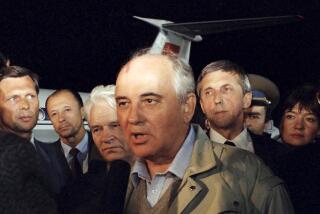Socialism and Pluralism Are Fire and Ice : Soviet Union: Hypocrisy and coercion still reign. But there are signs that the Kremlin knows it is no longer invincible.
During his recent talks in the Kremlin with Secretary of State James A. Baker III, President Mikhail S. Gorbachev indulged, as usual, in a rambling monologue about the internal situation in the Soviet Union. The purpose of this monologue, I suspect, was not so much to enlighten Baker as to impress him with a questionable intellectualism. For example, Gorbachev spoke about a “moral political directive”--in other words, defining political events in a moral framework. In the Soviet Union, he said, everything was at one time decided in the end by force. “The political culture was like this: If you are my adversary and the power belongs to me, you must at least be in prison.” But now, Gorbachev continued,we have acknowledged the legality of pluralism in economics, in politics, in all of public life. There are no contradictions between “socialist choice” (Gorbachev’s description of perestroika ) and political pluralism or parliamentary democracy.
According to the official Soviet accounts, Baker “comprehended these reflections with understanding.” I don’t know what this means. I suspect nobody does, probably including Baker. In any case, one thing must be made clear: Socialist choice still means use of force, means violence, means coercion, means constraint. There is no enigma in it.
The history of every country where state socialism became a form of government unmistakably confirms that socialist choice could win and be maintained only by use of force. That’s why, contrary to Gorbachev’s philosophizing, socialist choice can’t coexist with political pluralism, parliamentary democracy and a free market. The combination is fire and ice.
The recent events in the Soviet Union--the bloody crackdown in the Baltic republics, the ban against protest rallies in Moscow, a creeping abridgment of the freedom of speech and of the press, an attempt to suppress the miners’ strike by the new team in the Kremlin--persuasively show that socialist choice is on the offensive.
In the aftermath of China’s Tian An Men Square massacre, I tried to tell myself and my Izvestia readers that Red Square would never become Tian An Men. Why? To begin with, it was the period of perestroika’s blooming. Everyone was elated. The first Congress of People’s Deputies had started its meetings in the Kremlin. Gorbachev himself was talking not about socialist choice but about freedom of choice.
But it was not just elation. There were some harder explanations why Red Square would not become Tian An Men. In China, economic reforms were not supported by political ones. The success of economic reforms did not bring freedom. The Soviet leadership had opted for political reforms. Of course, sooner or later the political reform must be strengthened by the economic; otherwise it will collapse. But freedom is the indispensable guarantee to economic success.
What went wrong? Where were the flaws of my analysis? The obvious explanation lies in the failure of the Soviet economy.
Our economic crisis is not just the result of negligence and of time wasted. In fact, Gorbachev & Co. understand well that a free market means the end of socialist choice and their own power. It is sheer hypocrisy when the Kremlin offers humanitarian excuses for its reluctanceto introduce economic shock therapy (not April Fool’s Day price rises, but Polish-style transformation.) The Kremlin is sorry not for the people, but for itself.
The political culture in the Kremlin is the same as before, but the recent failure to stop mass demonstrations in Moscow shows that the Kremlin is no longer invincible, that the Kremlin itself can become a prison with its inhabitants under siege.
It is no longer utterly impossible for Red Square to become Tian An Men Square. But I don’t think that it will happen. Not because the new Gorbachev team has abandoned the old political culture of the Kremlin, but because it remembers the experience of other squares. In Prague, for example, not to mention Bucharest.
More to Read
Sign up for Essential California
The most important California stories and recommendations in your inbox every morning.
You may occasionally receive promotional content from the Los Angeles Times.










